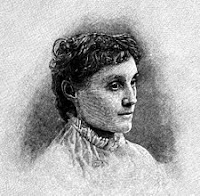How to Write Poetry
by Ethel Maude Colson
It is assumed that those sufficiently interested in the writing of poetry to read books about it already are acquainted with the little that may be known of the laws of English prosody or at least know how and where to find them. And those who desire to follow far the keen study of poetic production are commended to such admirable works as Max Eastman's sympathetic treatise on The Enjoyment of Poetry, C. E. Andrews enlightening and comprehensive volume, T he Reading and Writing of Verse, Marguerite Wilkinson's The New Voices, An Introduction to Can temporary Poetry; and The New Era in American Poetry, by Louis Untermeyer. Each of these books, especially, perhaps, that of Professor Andrews, will help the serious, poetic student to much that he ought to know.
Buy Ethel Maude Colson Books at Amazon
About the Author
Edith Matilda Thomas (August 12, 1854 – September 13, 1925) was an American poet who "was one of the first poets to capture successfully the excitement of the modern city." Wikipedia
The PDF might take a minute to load. Or, click to download PDF.
If your Web browser is not configured to display PDF files. No worries, just click here to download the PDF file.


.jpeg)

No comments:
Post a Comment